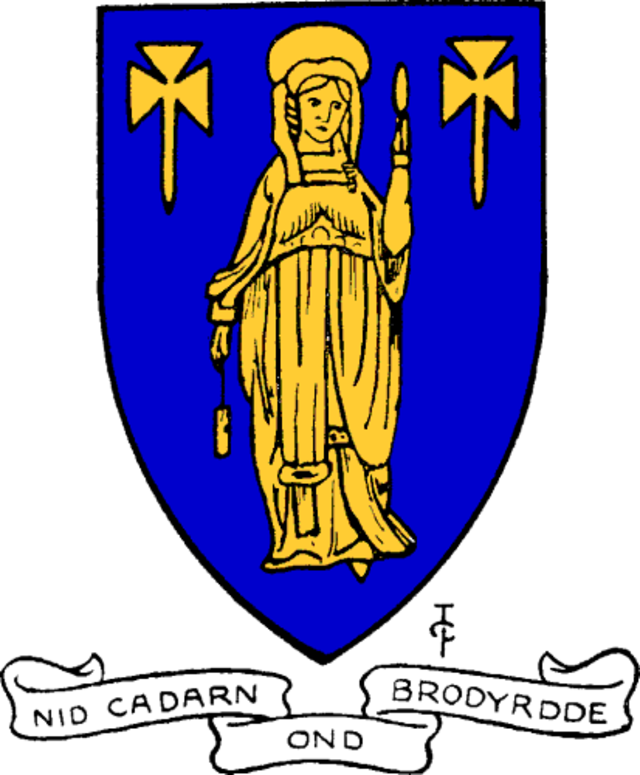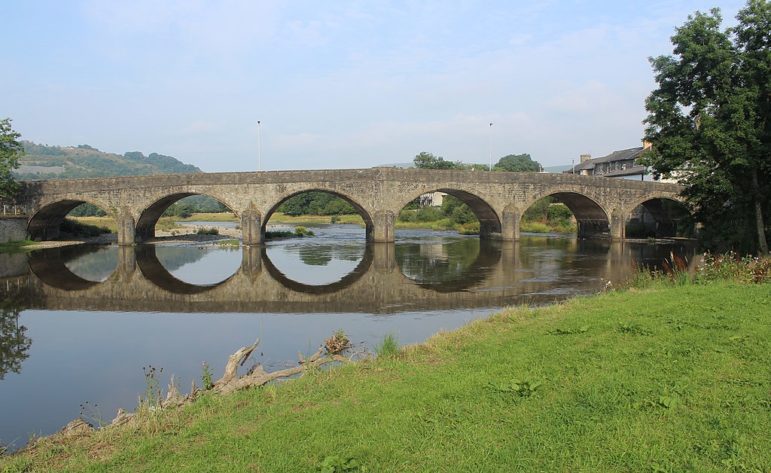MERTHYR TYDFIL, Wales – “Donald Brett was a strong character and evidence has shown that he was firm in expressing his wishes to the defendants about how it was he wanted to die and how he wished to be buried” reported Prosecutor Tom Scapens at Merthyr Tydfil Crown Court in early August.
Donald Brett’s daughter, Eirys, aged 31, and her partner Mark Watson, aged 46, buried Donald Brett, who died of natural causes (he was suffering from both lung issues and prostate cancer), in the woodland near his farmhouse home in Aberedw, near Builth Wells in mid-Wales.
Brett had made it clear to his family that he wanted to be buried in “a medieval non-Christian style” in the woods, a request they honoured when he died in 2019.

Merthyr Tydfil coat of arms [public domain]
However, questions then arose over his disappearance and his daughter and son-in-law were subsequently arrested. They told the authorities where the body lay and it was exhumed. Brett and Watson then faced a court appearance: under U.K. law (as in many countries), you have to register a death and there is a substantial amount of bureaucracy to go through.
The court seems to have taken a practical approach to this particular case, however. The prosecutor commented that Mr. Brett:
“…would not seek medical attention or advice unless it was completely unavoidable and if he had to seek treatment, he would only allow the minimal intervention. This is confirmed by medical notes and statements throughout the investigation.
The defendants carried out those wishes both in a sense of love and loyalty to Donald Brett but also because his wishes accorded with their own views about a person should live and receive medical attention.
They were extremely misguided, but it was not malicious.”
Brett’s lawyer Nicholas Gedge backed up the prosecutor’s comments, saying that: “It is clear this was something that happened out of something of loyalty and love. It was misguided but wasn’t borne out of anything other than love and loyalty. She is of good character.”
The Judge, recorder Gregg Bull Queen’s Counsel, agreed, stating to the couple that, “You took every loving care in burying him. This was not a rushed burial in the dead of night in some underhand way. The way in which he was buried showed that you loved him, and I take that into account. It seems to me that I will have to pass a sentence of imprisonment because the public requires that the dead are dealt with in a decent way.”
“You are a loving couple who were faced with the death of Miss Brett’s father from natural causes. By reason of your respective lifestyles, it was hoped that he could be buried with an unconventional method.”
“You chose to give him his last rites in what can be best described as some sort of pagan funeral.”
“Everybody’s entitled to their beliefs and make no comment about yours. But you should have gone about it in a different way.”
“You could have achieved the same objective by following the law and that is not simply where you think or where he thinks is appropriate but where you are permitted to bury him and to register the death – those were the two things you failed to do.”

Bridge over the Wye at Builth Wells. Pont dros Afon Gwy, Llanfair-ym-Muallt, Cymru [Photo Credit Martinvl – CC ASA 4.0]
In England and Wales there is no law prohibiting burial on private land. For those wanting to be buried on private land, however, there are a number of steps they need to take: if it’s the garden of a house, for instance, they need to inform the mortgage company if they still have an interest in the property, and also there is a need to inform the police so that they can rule out foul play.
In addition, the precise location of the grave should be marked on the deeds to reduce the complication of police involvement if human remains are found in the future. Plus, checking with a solicitor that there is no covenant for the property precluding burials from taking place.
Prior to burial, the death needs to be registered with the local Registrar of births, deaths and marriages. Following the burial, the certificate must be returned to them within 96 hours. And additionally, the need to carry out checks to make sure that the body has not been buried within a certain distance of water supplies or electrical cables.
Unfortunately, Brett and her partner seem to have done none of these things, hence the court case. They both received four-month suspended sentences, but, as above, will not actually be jailed due to the relatively lenient view taken by the court.
Most funeral directors in the U.K. will have details of natural burial places and Pagan celebrants. Funerals may take place in a crematorium or outside, but it is still imperative to follow the law. Organisations such as Sussex-based LifeRites can advise on both practical and ritual matters.
It is not known whether Brett and Watson are actually Pagan themselves, or indeed whether Donald Brett was: he may just have preferred the idea of a Pagan-style burial, just as some non-Pagan couples want a handfasting.
We asked U.K .Pagans for their views, some of which perhaps erred somewhat on the side of levity:
Malcolm White, archaeologist and Pagan, told TWH, “I think they should have gone about it a bit differently. They should have registered the death and done the legal bit. But if he wanted burying on his land then I don’t see why not. Someone else’s land though, not without their consent. The article isn’t clear whether the body was buried on his land or not.”
“I want to be embalmed and turned into a standard lamp – no comments please about the switch or where the flex is going to go,” Peter Nash, a Wiccan said.
The Wild Hunt is not responsible for links to external content.
To join a conversation on this post:
Visit our The Wild Hunt subreddit! Point your favorite browser to https://www.reddit.com/r/The_Wild_Hunt_News/, then click “JOIN”. Make sure to click the bell, too, to be notified of new articles posted to our subreddit.